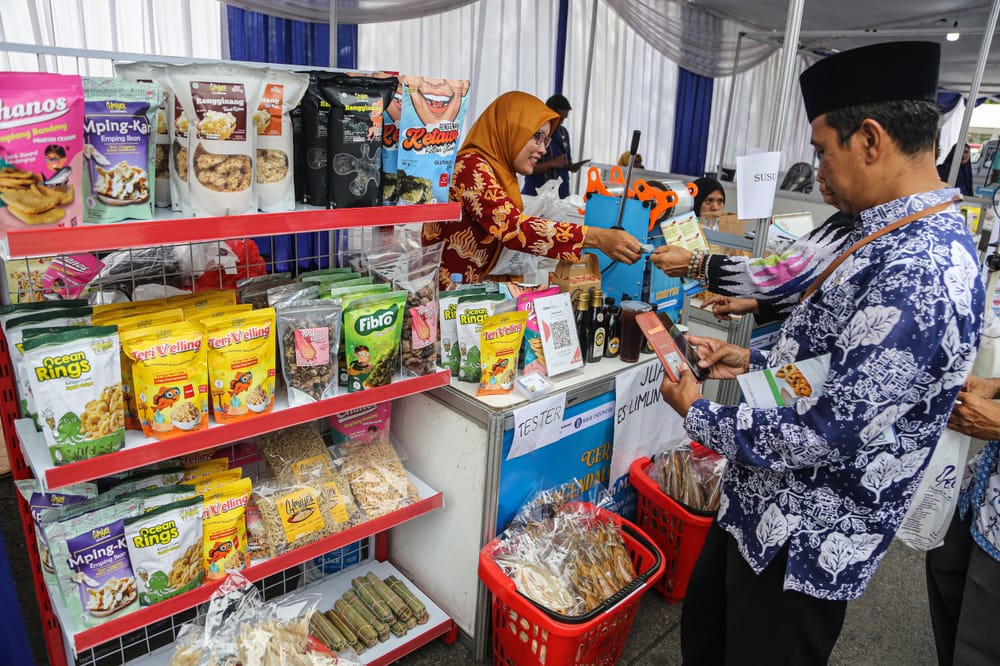Recently, unrest has been sweeping through sellers or online merchants. The culprit is a new policy that allows buyers to return items they no longer need through TikTok Shop by Tokopedia.
Conversely, experts and e-commerce associations welcome this new regulation. They call the policy a middle ground in protecting consumers.
Mochammad Risqy Faisal expressed his concerns regarding this matter. Through his social media account, Faisal plans to switch platforms soon.
"From now on, I don't want to use Tokped (Tokopedia) anymore to send goods. Close the shop and delete the application. Then move to another platform," he said, annoyed.
Ferry Santoso expressed a similar sentiment, "This is probably a case of wanting to die and inviting sellers to die with you," he said.
Another online merchant, Sahid Cahyo, complained that he was already experiencing difficulties in offering his products online on the platform.
"First, in May, I couldn't add merchandise. Second, at the end of May, the disbursement of funds took 6 working days, and the buyer's chat notifications didn't appear," he said.
The root of the problem is that, starting July 21, 2025, Tokopedia and TikTok Shop announced a new policy, namely the return of products from buyers for the reason of 'No Longer Needed'.
“This update aims to improve the buyer's shopping experience while maintaining consistency in return policies across the platform,” wrote TikTok Shop by Tokopedia via the seller center page.
The platform argues that this update aims to improve the buyer's shopping experience while maintaining consistency in return policies across the platform.
With the presence of this latest return policy, buyers can return goods simply because they have changed their minds.
Although it has caused unrest among sellers, Tokopedia also provides protection so that they are not completely disadvantaged.
The main requirement is that products to be returned for the reason of 'no longer needed' must have a ‘easy to return’ label – which is stated on the product details page.
Buyers can submit a return request with the reason 'No Longer Needed' within 15 calendar days from when the product is shipped for the Mall category and 6 calendar days from when the product is received for other categories.
As long as all conditions are met, the shipping costs for the return will be borne directly by the platform.
In addition, sellers can also consider return requests from buyers by looking at photos of the condition of the goods and providing detailed reasons if the seller wants to reject the return request.
TikTok Shop by Tokopedia also explained the steps that sellers must take when handling return requests like this.
Sellers are asked to check the photos uploaded by buyers to check the condition of the goods according to return standards, then they can communicate directly through the chat feature if additional information is needed.
Sellers are given a maximum of two calendar days to decide whether to approve or reject the return request. If they decide to reject it, sellers must provide clear and detailed reasons.
In addition, sellers are also advised to continue to ensure that the product descriptions are complete and accurate, include original photos, and add size guides or instructions for use to minimize the risk of returns.
Win-Win Solution
This new policy is not just about convenience for buyers. In an increasingly dynamic online shopping era, return flexibility is considered to increase consumer confidence and encourage transactions.
In addition to providing convenience for buyers, the return policy also helps Mall stores and UMKM to increase credibility. With the 'easy to return' label, products are more attractive in the eyes of potential buyers who are hesitant to shop online.
Reancy Triashari from IdEA, the Indonesian e-commerce association, calls the TikTok Shop by Tokopedia's "no longer needed" item return policy a step that benefits all parties.
"We believe each member has carefully considered their policies before launching them on their platforms," said Reancy.
According to her, this kind of policy is a form of better service for buyers, helps maintain seller trust, and supports sustainable business growth.
Similarly, Nailul Huda from the Center of Economic and Law Studies (Celios) explained that post-purchase responsibility is indeed an obligation for e-commerce business actors, both sellers and platforms.
"If we refer to who issues the invoice, then the responsibility lies with the platform," said Nailul.
He added that, in accordance with the Consumer Protection Law, business actors are obliged to provide compensation for traded goods, either in the form of a refund or replacement of goods.
"The time frame is seven days from the date of the transaction. In e-commerce practice, it should be calculated from when the goods are received, as long as the condition of the goods and completeness such as price tags remain intact," he said.
'Mall' Sellers Skyrocket
Along with this return policy, TikTok Shop by Tokopedia also reported a surge in the number of sellers with 'Mall' status in the first half of 2025, which increased more than fourfold compared to the second half of 2024.
Sellers in the 'Mall' category are those who have the status of official brand owners, authorized distributors, or verified stores with high reputations. They get a number of exclusive facilities such as special badges, ease of promotion on strategic pages of the platform, and access to large-scale marketing campaigns.
"The rapid growth of Mall sellers on TikTok Shop by Tokopedia shows how important this platform is in supporting business actors, including UMKM in various regions, to develop their businesses," said Stephanie Susilo, Senior Director of Tokopedia and TikTok E-commerce, in a press release last week (16/7).
In addition to special labels, Mall sellers also get benefits such as exclusive vouchers, free shipping programs, 100% original product guarantees, and a product return service of up to 15 days.
First half of 2025 data from TikTok Shop by Tokopedia recorded a number of best-selling products that dominated Mall store sales.
- Fashion category: women's sneakers, hijabs, and school shoes were the most purchased.
- Beauty and personal care category: lipstick, foundation, and various skincare products such as serums, creams, and face masks.
- Food and beverage category: sambal, moringa powder, and hampers.
Interestingly, a number of Mall sellers also experienced a surge in transactions of more than 15 times compared to the previous period, with a rapidly growing list of brands dominated by local Indonesian brands. "This fact shows a tendency for buyers to increasingly choose official products from original brands, authorized distributors, or verified stores on the platform," Stephanie added in writing.






